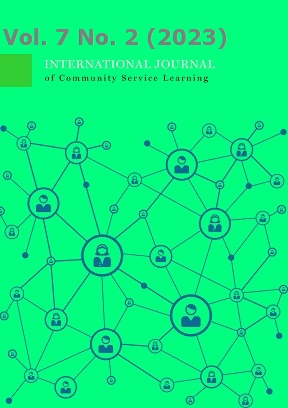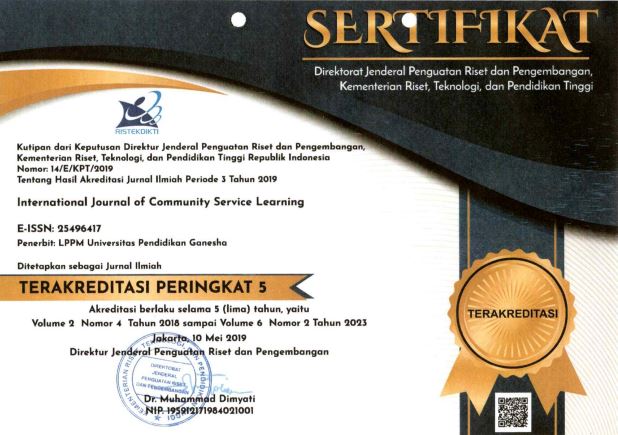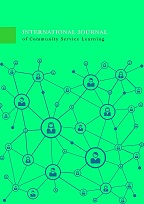E-Module Design Workshop as Professional Development Program for Pre-School Teachers
DOI:
https://doi.org/10.23887/ijcsl.v7i2.57681Keywords:
Professional Development, Teacher Professionalism, E-Module, Workshop, Early Childhood EducationAbstract
Early childhood education is a form of education that places the children at the centre of the learning process and is adapted to the child's developmental stage. To conduct an engaging and meaningful process in Early Childhood Education (PAUD), teachers are expected to improve their capacities in order to catch up with the technological development. The proposed community empowerment program would involve KB Taman Harapan which is located at Jl Raya Sumbersekar No 108 RT 01 RW 03 Krajan, Sumbersekar, Malang. Based on what was observed and what was stated in the interview with the principal, KB Taman Harapan is struggling with challenges. In the first place, they are having trouble dealing with the lack of professional development programs for the teachers. Second, the principal indicated that they are also dealing with some financial issues. Lastly, the principal also mentioned that they were having difficulty generating interesting resources for online instruction. The main agendas would be organized to solve the issues, namely providing training for e-module development program for teachers and providing a tryout session for the results of the e-module. In the process, there would be 4 stages of action: (1) Planning, (2) implementation, (3) Evaluation.
References
Aditya, B. R., Ismiatun, A. N., Atika, A. R., & Permadi, A. (2022). Digital disruption in early childhood education: A qualitative research from teachers’ perspective. Procedia Computer Science, 197, 521–528. https://doi.org/10.1016/j.procs.2021.12.169. DOI: https://doi.org/10.1016/j.procs.2021.12.169
Al Amin, M. N. K. (2018). Komunikasi Sebagai Upaya Untuk Membangun Ketahanan Keluarga Dalam Kajian “Teori Nilai Etik". Al-Ahwal: Jurnal Hukum Keluarga Islam, 11(1), 79–90. https://doi.org/10.14421/ahwal.2018.11107. DOI: https://doi.org/10.14421/ahwal.2018.11107
Aras, S. (2016). Free play in early childhood education: a phenomenological study. Early Child Development and Care, 186(7), 1173–1184. https://doi.org/10.1080/03004430.2015.1083558. DOI: https://doi.org/10.1080/03004430.2015.1083558
Blanchard, S. B., King, E., Van Schagen, A., Scott, M. R., Crosby, D., & Beasley, J. (2018). Diversity, inclusion, equity, and social justice: How antibias content and self-reflection support early childhood preservice teacher consciousness. Journal of Early Childhood Teacher Education, 39(4), 346–363. https://doi.org/10.1080/10901027.2017.1408722. DOI: https://doi.org/10.1080/10901027.2017.1408722
Cahyaningrum, E. S., Sudaryanti, S., & Purwanto, N. A. (2017). Pengembangan nilai-nilai karakter anak usia dini melalui pembiasaan dan keteladanan. Jurnal Pendidikan Anak, 6(2), 203–213. https://doi.org/10.21831/jpa.v6i2.17707. DOI: https://doi.org/10.21831/jpa.v6i2.17707
Dewi, A. R. T., Mayasarokh, M., & Gustiana, E. (2020). Perilaku Sosial Emosional Anak Usia Dini. Jurnal Golden Age, 4(1), 181–190. https://doi.org/10.29408/goldenage.v4i01.2233. DOI: https://doi.org/10.29408/jga.v4i01.2233
Erdreich, L. (2021). Managing Parent Capital: Parent-Teacher Digital Communication Among Early Childhood Educators. Italian Journal of Sociology of Education, 13(1), 135–159. https://doi.org/10.14658/PUPJ-IJSE-2021-1-6.
Falloon, G. (2020). From digital literacy to digital competence: the teacher digital competency (TDC) framework. Educational Technology Research and Development, 68, 2449–2472. https://doi.org/10.1007/s11423-020-09767-4. DOI: https://doi.org/10.1007/s11423-020-09767-4
Forzani, F. M. (2014). Understanding “Core Practices” and “Practice-Based” Teacher Education: Learning From the Past. Journal of Teacher Education, 65(4), 357–368. https://doi.org/10.1177/0022487114533800. DOI: https://doi.org/10.1177/0022487114533800
Hasanah, U., & Priyantoro, D. E. (2019). Pengembangan Kreativitas Anak Usia Dini melalui Origami. Elementary: Jurnal Iilmiah Pendidikan Dasar, 5(1), 61–72. https://e-journal.metrouniv.ac.id/index.php/elementary/article/view/1340. DOI: https://doi.org/10.32332/elementary.v5i1.1340
Ismail, S., Ruswandi, U., & Erihadiana, E. (2020). The Competence of Millennial Islamic Education Teachers in Facing The Challenges of Industrial Revolution. Nazhruna: Jurnal Pendidikan Islam, 3(3), 389–405. https://doi.org/10.31538/nzh.v3i3.823. DOI: https://doi.org/10.31538/nzh.v3i3.823
Jaya, P. R. P., Ndeot, F., Palmin, B., & Angkur, M. F. M. (2023). Intercorrelation of Factors which Determine the Early Childhood Education Quality. Cakrawala Dini: Jurnal Pendidikan Anak Usia Dini, 14(1), 52–60. https://doi.org/10.17509/cd.v14i1.56230.
Juanda, J. (2018). Revitalisasi nilai dalam dongeng sebagai wahana pembentukan karakter anak usia dini. Jurnal Pustaka Budaya, 5(2), 11–18. https://doi.org/10.31849/pb.v5i2.1611. DOI: https://doi.org/10.31849/pb.v5i2.1611
Kuhn, M., Marvin, C. A., & Knoche, L. L. (2017). In It for the Long Haul: Parent–Teacher Partnerships for Addressing Preschool Children’s Challenging Behaviors. Topics in Early Childhood Special Education, 37(2), 81–93. https://doi.org/10.1177/0271121416659053. DOI: https://doi.org/10.1177/0271121416659053
Maimunah, M., Aslamiah, A., & Suriansyah, A. (2018). The integration of sentra-based Learning and involvement of family program at early childhood in developing character building (Multi Case at PAUD Mawaddah and PAUD Alam Berbasis Karakter Sayang Ibu Banjarmasin, Indonesia). European Journal of Education Studies, 5(7). https://doi.org/10.46827/ejes.v0i0.2101.
McClure, M., Tarr, P., Thompson, C. M., & Eckhoff, A. (2017). Defining quality in visual art education for young children: Building on the position statement of the Early Childhood Art Educators. Arts Education Policy Review, 118(3), 154–163. https://doi.org/10.1080/10632913.2016.1245167. DOI: https://doi.org/10.1080/10632913.2016.1245167
Meyer, M., Zosh, J. M., McLaren, C., Robb, M., McCaffery, H., Golinkoff, R. M., Hirsh-Pasek, K., & Radesky, J. (2021). How educational are “educational” apps for young children? App store content analysis using the Four Pillars of Learning framework. Journal of Children and Media, 15(4), 526–548. https://doi.org/10.1080/17482798.2021.1882516. DOI: https://doi.org/10.1080/17482798.2021.1882516
Mutia, N. B., & Pritasari, A. C. (2022). Pengembangan e-modul interaktif IPA dasar sebagai media pembelajaran. Al-Azkiya: Jurnal Ilmiah Pendidikan MI/SD, 7(2), 184–193. https://doi.org/10.32505/azkiya.v7i2.5536. DOI: https://doi.org/10.32505/azkiya.v7i2.5536
Nasir, N., Bagea, I., Sumarni, S., Herlina, B., & Safitri, A. (2020). Memaksimalkan Fitur Breaking Rooms Zoom Meeting pada Pendidikan Anak Usia Dini di Masa Pandemi Covid-19. Jurnal Obsesi: Jurnal Pendidikan Anak Usia Dini, 5(1), 611–624. https://doi.org/10.31004/obsesi.v5i1.662. DOI: https://doi.org/10.31004/obsesi.v5i1.662
Nolan, A., & Molla, T. (2017). Teacher confidence and professional capital. Teaching and Teacher Education, 62, 10–18. https://doi.org/10.1016/j.tate.2016.11.004. DOI: https://doi.org/10.1016/j.tate.2016.11.004
Nugraha, B. (2015). Pendidikan Jasmani Olahraga Usia Dini. Jurnal Pendidikan Anak, 4(1). https://doi.org/10.21831/jpa.v4i1.12344. DOI: https://doi.org/10.21831/jpa.v4i1.12344
Nur, L., Hafina, A., & Rusmana, N. (2020). Kemampuan Kognitif Anak Usia Dini Dalam Pembelajaran Akuatik. Scholaria: Jurnal Pendidikan Dan Kebudayaan, 10(1), 42–50. https://doi.org/10.24246/j.js.2020.v10.i1.p42-50. DOI: https://doi.org/10.24246/j.js.2020.v10.i1.p42-50
Nurkolis, N., & Muhdi, M. (2020). Keefektivan Kebijakan E-Learning berbasis Sosial Media pada PAUD di Masa Pandemi Covid-19. Jurnal Obsesi: Jurnal Pendidikan Anak Usia Dini, 5(1), 212–228. https://doi.org/10.31004/obsesi.v5i1.535. DOI: https://doi.org/10.31004/obsesi.v5i1.535
Palupi, R., & Watini, S. (2022). Penerapan Model Atik untuk Meningkatkan Kognitif Anak Usia Dini melalui Permainan Tata Balok di PAUD Rama Rama Tangerang Selatan. PEDAGOGIA: Jurnal Pendidikan, 5(2), 621–627. https://doi.org/10.54371/jiip.v5i2.466. DOI: https://doi.org/10.54371/jiip.v5i2.466
Priyanti, N., & Warmansyah, J. (2021). The Effect of Loose Parts Media on Early Childhood Naturalist Intelligence. Jurnal Pendidikan Usia Dini, 15(2), 239–257. https://doi.org/10.21009/JPUD.152.03. DOI: https://doi.org/10.21009/JPUD.152.03
Purba, R. I., Sinaga, P., Harianja, E., & Parani, R. (2022). Strategi Asesor Akreditasi Paud Dan Upaya Peningkatan Mutu Pendidikan Anak Usia Dini. Jurnal Golden Age, 6(1), 128–142. https://doi.org/10.29408/goldenage.v6i1.4512.
Rahman, A., Wibawa, B., & Sumantri, S. (2022). Develop English Electronic Module for Tourism Through Analysis of Learner’s and Context. Education Quarterly Reviews, 5(1). https://doi.org/10.31014/aior.1993.05.01.417. DOI: https://doi.org/10.31014/aior.1993.05.01.417
Rasmani, U. E. E., Nurjanah, N. E., Jumiatmoko, J., Widiastuti, Y. K. W., Agustina, P., & Nazidah, M. D. P. (2022). Multimedia Interaktif PAUD dalam Perspektif Merdeka Belajar. Jurnal Obsesi: Jurnal Pendidikan Anak Usia Dini, 6(5), 5397–5405. https://doi.org/10.31004/obsesi.v6i5.2962. DOI: https://doi.org/10.31004/obsesi.v6i5.2962
Rismayani, R., Afiif, A., Alwi, B. M., & Ismail, I. (2021). Pencapaian Indikator Sekolah Ramah Anak Pada Paud Di Kecamatan Majauleng Kabupaten Wajo. NANAEKE: Indonesian Journal of Early Childhood Education, 4(1), 26–41. https://doi.org/10.24252/nananeke.v4i1.21545. DOI: https://doi.org/10.24252/nananeke.v4i1.21545
Safitri, D., & Sos, S. (2019). Menjadi guru profesional. PT. Indragiri Dot Com.
Salasiah, S., Asniwati, A., & Effendi, R. (2018). Instilling character values in early childhood in the perspective of curriculum and parenting (Multi-Site Study in PAUD Islam Sabilal Muhtadin and PAUD Mawaddah, Banjarmasin, Indonesia). European Journal of Education Studies, 5(7). https://doi.org/10.5281/zenodo.1494201.
Setiawan, M. H. Y. (2018). Kreativitas Pendidik Dalam Pengelolaan Kegiatan Pada Pembelajaran Saintifik Pada Implementasi Kurikulum PAUD 2013. JURNAL AUDI: Jurnal Ilmiah Kajian Ilmu Anak Dan Media Informasi PAUD, 3(2), 118–126. https://doi.org/10.33061/ad.v3i2.2736. DOI: https://doi.org/10.33061/ad.v3i2.2736
Sidiq, R., Najuah, N., Lukitoyo, P. S., Manalu, J. P., & Elvansya, Z. (2022). Development of Interactive E-module Based on Infographic Multimedia In Islamic History Of Indonesian Courses As An Innovative Learning Source. International Journal of Educational Research and Social Sciences (IJERSC), 3(1), 135–139. https://doi.org/10.51601/ijersc.v3i1.261.
Siron, Y. (2020). PAUD Inklusif: Efikasi Diri dan Tingkat Literasi Guru Memengaruhi Kemampuan Merancang Individualized Education Program (IEP)? Al-Athfal: Jurnal Pendidikan Anak, 6(1), 1–14. https://doi.org/10.14421/al-athfal.2020.61-01. DOI: https://doi.org/10.14421/al-athfal.2020.61-01
Spencer, M. B., Lodato, B. N., Spencer, C., Rich, L., Graziul, C., & English-Clarke, T. (2019). Chapter Four - Innovating resilience promotion: Integrating cultural practices, social ecologies and development-sensitive conceptual strategies for advancing child well-being. Advances in Child Development and Behavior, 57, 101–148. https://doi.org/10.1016/bs.acdb.2019.05.005. DOI: https://doi.org/10.1016/bs.acdb.2019.05.005
Sugianto, D., Abdullah, A. G., Elvyanti, S., & Muladi, Y. (2013). Modul virtual: Multimedia flipbook dasar teknik digital. Invotec, 9(2). https://doi.org/10.17509/invotec.v9i2.4860. DOI: https://doi.org/10.17509/invotec.v9i2.4860
Sutama, I. W., Astuti, W., & Anisa, N. (2021). E-Modul Strategi Pembelajaran Anak Usia Dini Sebagai Sumber Belajar Digital. Jurnal Pendidikan Anak Usia Dini Undiksha, 9(3), 449–456. https://doi.org/10.23887/paud.v9i3.41385. DOI: https://doi.org/10.23887/paud.v9i3.41385
Taggart, G. (2016). Compassionate pedagogy: the ethics of care in early childhood professionalism. European Early Childhood Education Research Journal, 24(2), 173–185. https://doi.org/10.1080/1350293X.2014.970847. DOI: https://doi.org/10.1080/1350293X.2014.970847
Turin, O., & Davidson, S. (2022). Riding the tiger: professional capital and the engagement of Israeli kindergarten teachers with parents’ WhatsApp groups. Journal of Professional Capital and Community, 7(4), 334–352. https://doi.org/10.1108/JPCC-04-2022-0023. DOI: https://doi.org/10.1108/JPCC-04-2022-0023
Ulfadhilah, K. (2021). Pengaruh Metode Pembelajaran Efektif Di Masa Pandemi Pada Anak Usia Dini di RA Nurul Falah Cirebon. Yaa Bunayya: Jurnal Pendidikan Anak Usia Dini, 5(1), 1–17. https://doi.org/10.24853/yby.5.1.1-17.
Winatha, K. R. (2018). Pengembangan E-modul Interaktif Berbasis Proyek Mata Pelajaran Simulasi Digital. Jurnal Pendidikan Teknologi Dan Kejuruan, 15(2). https://doi.org/10.23887/jptk-undiksha.v15i2.14021. DOI: https://doi.org/10.23887/jptk-undiksha.v15i2.14021
Zahro, I. F., Atika, A. R., & Westhisi, S. M. (2019). Strategi Pembelajaran Literasi Sains Untuk Anak Usia Dini. Jurnal Ilmiah Potensia, 4(2), 121–130. https://doi.org/10.33369/jip.4.2.121-130. DOI: https://doi.org/10.33369/jip.4.2.121-130
Downloads
Published
How to Cite
Issue
Section
License
Copyright (c) 2023 Laela Nurbatra, Masyhud Masyhud

This work is licensed under a Creative Commons Attribution-ShareAlike 4.0 International License.

International Journal of Comunnity Service Learning is licensed under a Creative Commons Attribution-ShareAlike 4.0 International License.













